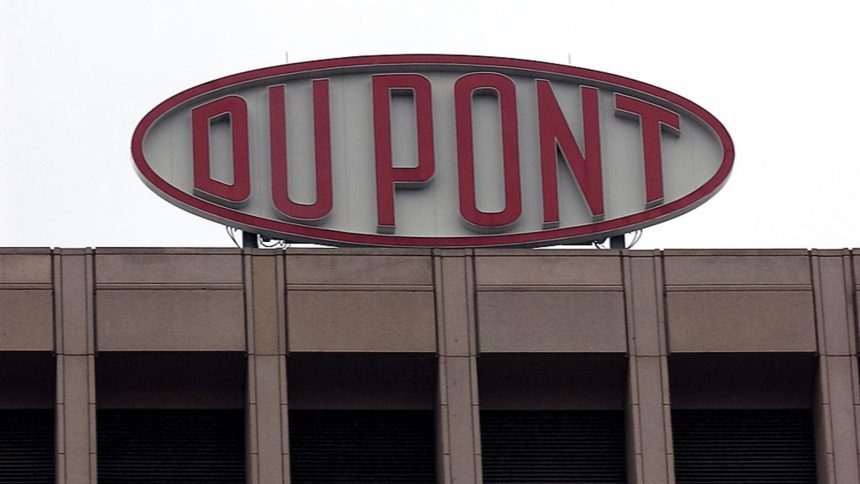For almost two years, Wall Street has been captivated by the emergence of generative AI. But as DuPont prepares to break itself up into three separate companies, one of its surprisingly attractive businesses involves something we’ve never been able to do without it: water. In late May, the chemical and materials maker announced plans to split into three publicly traded entities — the water business, an electronics-focused firm that benefits from AI and a new DuPont serving the health care, mobility and construction markets, among others. DuPont’s ability benefit from artificial intelligence adoption helped attract us to the stock a year ago . But since the breakup was disclosed, its water unit, which sells filtration and purification products, has garnered outsized interest. “I believe that the water company will be purchased for a much bigger price” than its currently being valued at inside the diversified DuPont, Jim Cramer said last week as he reacted to the Club holding’s stronger-than-expected earnings report . “A $35 billion company [in DuPont] could be worth $50 billion frankly when this is finished.” For now, though, DuPont’s market value and stock price are essentially the same as when the separation process publicly began. It’s not entirely surprising, given the 18-to-24 month timeline means some investors will only get interested when a resolution is closer. Still, at present, Wall Street is not giving DuPont enough credit. Our sum-of-the-parts analysis after the breakup was unveiled determined DuPont to be worth $100 a share — an intentionally conservative call on the stock, which currently trades around $78 a share. DuPont shedding its conglomerate structure will almost certainly result in its individual business segments to fetching higher valuations as standalone firms — or, perhaps, as acquisition targets from rivals. Both options are on the table, particularly for the water business, which is reportedly drawing interest from peers in the industry . Although DuPont CEO Lori Koch said it’s not yet had any conversations about an outright sale of the water unit, the reason it’s such a focus is simple: It’s a really good business in an industry capturing more and more investor attention. In fact, it stands out as a “crown jewel” across DuPont’s business lines thanks to its organic growth prospects, KeyBank analyst Aleksey Yefremov said in a recent CNBC interview. The analyst’s growth rate projections are currently in the mid-single digits, but he said those estimates have long-term potential to accelerate to high-single digits. Our exercise of highlighting DuPont’s water business, in some ways, shows exactly why the company would want to break it out on its own. Tucked within the larger enterprise, it’s just a small piece of the pie. Under the status quo, investors who want access to the water theme — increasingly seen as a promising opportunity on Wall Street — may not look to DuPont for that exposure. Why own the current DuPont, which also sells Tyvek home wrap and rubber bonding adhesives for cars, when you could own water companies Xylem or Ecolab ? Why own DuPont, which also sells Great Stuff foam insulation, when you could own Veralto or Pentair ? It’s not that DuPont’s other units are undesirable. Its electronics business, for example, is growing thanks to the booming need for AI chips. It’s just that some investors are specialists and are looking for more narrowly focused opportunities. In its present form, DuPont may be too diversified for its water business to really stand out and be valued fairly. That disconnect is exactly why splitting it up could be so fruitful for shareholders. The case for water Emerging concerns over water quality around the world, tightening regulations and sustainability overall have elevated the status of water as an investment opportunity. Products that make water safe to use and consume — precisely what DuPont offers — are key to economic growth. JPMorgan estimates the economic value of freshwater for households, agriculture and industries to be close to $60 trillion. However, billions of people around the world live in water-scare areas. And some regions of the world could see their economic growth stunted in the decades ahead due to water-related losses, the World Bank estimates. “We see an urgent need to invest in water solutions given the current state of the water crisis,” analysts at Barclays wrote in an April research note. “The economic benefit of addressing water scarcity and quality concerns has been underappreciated with potential repercussions at both the macro and company level,” the analysts argued. DuPont’s water business fits the bill. Some analysts see that unit offering a triple threat that sets it apart from industry peers. They tout its technology leadership, brand strength and track record of innovation as appealing qualities to drive growth once it’s broken out as a standalone company. To be sure, DuPont’s water business has recently been caught in a cyclical downturn due to excess inventory at distributors and weaker industrial demand in China, which has been grappling with a sluggish economy. However, its second-quarter performance announced last week was better than expected, driven by an initial recovery in the all-important China market. While the third quarter is expected to be similar to the April-to-June period, executives said the fourth quarter will see more of a lift. Stepping back and looking out years into the future, there’s a lot to like. DD 1Y mountain DuPont’s stock performance over the past 12 months. DuPont’s water business DuPont is considered a leader in purification and specialty-separation technologies that generates cleaner water for industries, governments, and communities. Arun Viswanathan, analyst at RBC Capital Markets, characterizes Dupont’s water business’ next-generation products as being “at the top of the technology pyramid.” Its technologies consist of large, established brands such as FilmTec, IntegraTec and its Amber Series, which “command a premium in the marketplace,” Viswanathan said. To position their brands as premium quality products, Dupont invests heavily in them. RBC’s Viswanathan said the company’s research-and-development spending is around 6% of sales compared with roughly 4% for peers, which allows the company to constantly develop its premium products. Apart from its growing North America operations, Viswanathan said DuPont has a “very well-positioned business” in emerging markets where water contamination is a serious issue. For example, Dupont’s reverse osmosis membranes are used for filtration in areas with spotty access to clean water. He called out Asia, the Middle East, Africa, and Latin America — regions that he estimates account for 60% of the total portfolio — as sources of growth in the years ahead. For his part, KeyBank’s Yefremov believes Asia, in particular, will remain a place of expansion. Dupont’s water business is the smallest of the three companies that will be created by the breakup. Water generated about $1.5 billion in revenue in 2023, while electronics delivered roughly $4 billion in sales. The businesses that will make up the remaining DuPont post-split had revenue of $6.6 billion in 2023. Most importantly, though, DuPont’s water unit’s sales were accompanied by a full-year operating EBITDA margin of about 24%. The unit has a higher EBITDA margin higher than Xylem, a publicly traded company that has a wide-ranging business serving the water industry. It finished 2023 with EBITDA margin of 18.9%, according to FactSet, with analysts projecting it to rise to 20.3% in 2024. EBITDA — short for earnings before interest, taxes, depreciation, and amortization — is a measure of operating profitability. A glance at the EBITDA margins of other industry peers in 2023 underscores the attractiveness of DuPont’s water business: Ecolab checked in at 19.9%, Pentair was at 22.3% and Veralto finished at 24.1%. In general, a company with higher margins will command a premium valuation to its peers. As this exercise shows, DuPont’s water business as a standalone firm would certainly deserve that compared to some. However, considering the way the market is currently valuing the diversified DuPont, it’s unlikely that the water unit is being properly appreciated within the conglomerate entity — justifying the decision to break it out on its own. Or, alternatively, it helps justify the interest of potential suitors. Potential M & A It’s possible DuPont’s water business never makes it to standalone status. In an industry that’s no stranger to consolidation, DuPont management could look to sell it to a peer — especially if the market continues to keep a lid on the stock and management wants to kickstart shares. Yefremov is also convinced DuPont management could be open to such a scenario given that its water is the smaller of the three businesses. Still, management has “high expectations for price” since water is a “pretty unique asset,” Yefremov said. “They’ll try to get a premium if they can. If not, they’ll probably continue with a spin,” he added. DuPont’s water business has reportedly drawn interest from Xylem and Veralto — formerly part of Club holding Danaher — but there’s still uncertainty whether either will pursue a deal. On last week’s earnings call, CEO Koch said DuPont has not “had any conversations on selling the water business. So, our intent is still to spin.” However, we also know that executives’ desire is to maximize returns for investors. And that gives us confidence to stick with the stock. “If there is interest in the water business, we obviously will look at it and study it hard. If there’s a better path to creating value for our shareholders, we would clearly do that,” Executive Chairman Ed Breen added on Wednesday’s earnings call. “And I’ll just leave it at that for now.” (Jim Cramer’s Charitable Trust is long DD. See here for a full list of the stocks.) As a subscriber to the CNBC Investing Club with Jim Cramer, you will receive a trade alert before Jim makes a trade. Jim waits 45 minutes after sending a trade alert before buying or selling a stock in his charitable trust’s portfolio. If Jim has talked about a stock on CNBC TV, he waits 72 hours after issuing the trade alert before executing the trade. THE ABOVE INVESTING CLUB INFORMATION IS SUBJECT TO OUR TERMS AND CONDITIONS AND PRIVACY POLICY , TOGETHER WITH OUR DISCLAIMER . NO FIDUCIARY OBLIGATION OR DUTY EXISTS, OR IS CREATED, BY VIRTUE OF YOUR RECEIPT OF ANY INFORMATION PROVIDED IN CONNECTION WITH THE INVESTING CLUB. NO SPECIFIC OUTCOME OR PROFIT IS GUARANTEED.
For almost two years, Wall Street has been captivated by the emergence of generative AI. But as DuPont prepares to break itself up into three separate companies, one of its surprisingly attractive businesses involves something we’ve never been able to do without it: water.
Read the full article here
News Room




